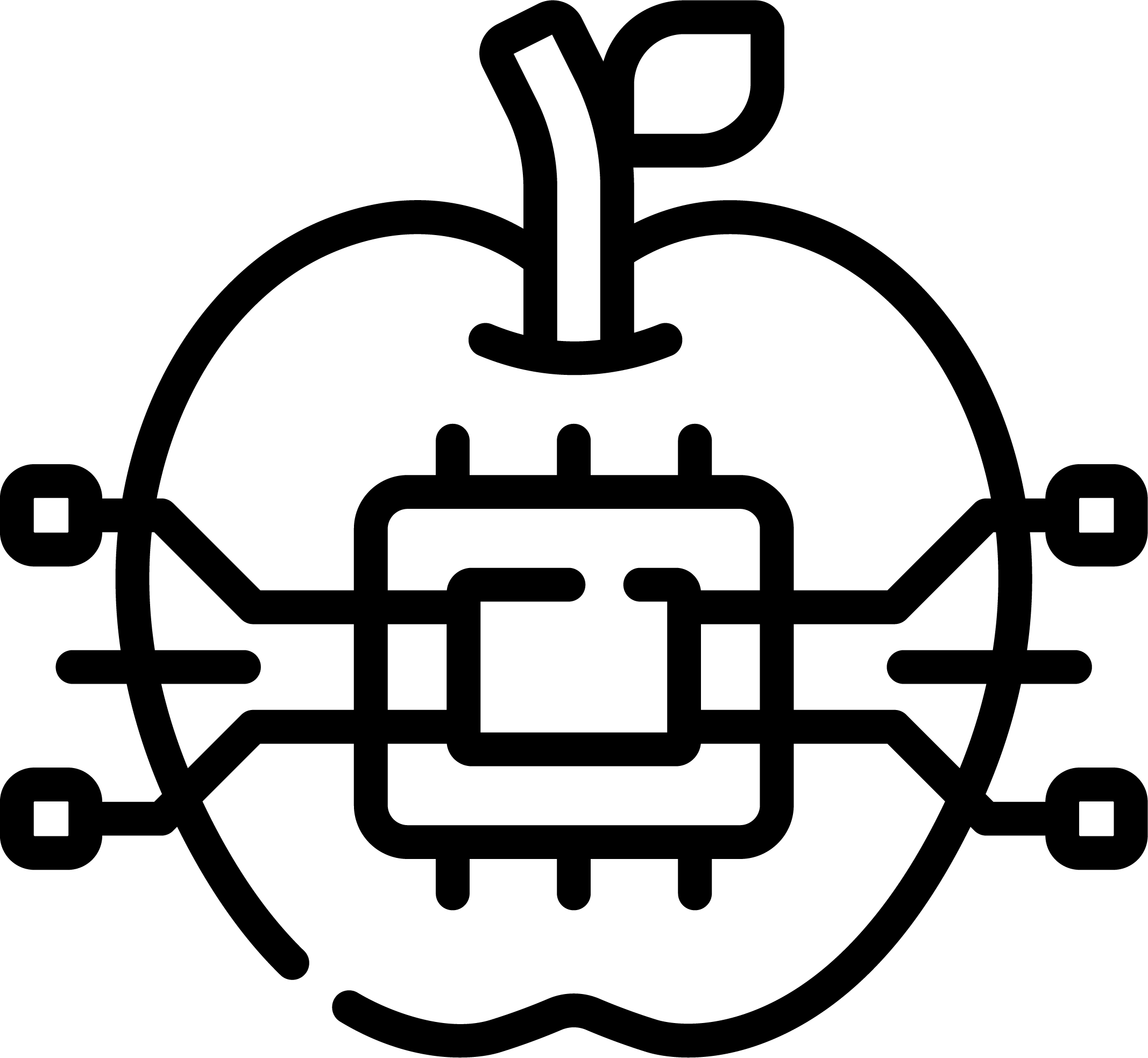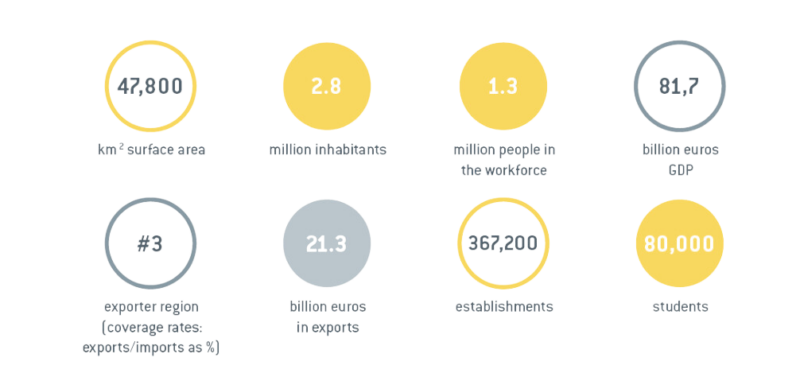2025 World Expo
Bourgogne-Franche-Comté, the right place!
 FoodTechMore information
FoodTechMore information HealthTechMore information
HealthTechMore information New MobilityMore information
New MobilityMore information Robotics AIMore information
Robotics AIMore information HydrogenMore information
HydrogenMore information Luxury and exceptional know-howMore information
Luxury and exceptional know-howMore information
Ecosystem of the Bourgogne-Franche-Comté region

1st region for private investment in R&D (amount of expenditure by private companies — 2020)
6 competitiveness clusters
16 clusters
12 technology facilities
16 high-end service incubators
Japanese firms based in Bourgogne-Franche-Comté
99 company sites
3,071 jobs
Research, Development & Innovation
- 17,000 R&D employees
- 61 labelled research units in Bourgogne-Franche-Comté
- 5,600 researchers (3/4 private, 1/4 public)
- + 20 world-leading private research centres
- The top four patent applicants in France do business in our region. Valéo, Stellantis, Safran, CEA
- 12 technology facilitie
4 healthcare facilities
Dijon Bourgogne University Hospital is the region’s leading cancer care establishment and benefits from cutting-edge technical platforms and expertise in numerous specialities such as the digestive system, pneumology, and paediatric haematology-oncology. It also works in other areas of research including:
- Lipid metabolism, inflammation, diabetes and vascular risk
- Functional and molecular imaging
- Genomics of developmental anomalies
- Sensory, motor and cognitive impairments, etc.
The university hospital in Besançon focuses its research work on four areas:
- Technological innovations
- Biotherapies: immunotherapy for cancer, transplantation and grafts, cell & genetic therapy
- The INCREASE university-hospital federation on inflammatory diseases
- Risks and vulnerability: infectious, neuro-cardiovascular, ethics/medical progress and vulnerable populations, quality of life
The CGFL is France’s second-biggest centre in terms of the inclusion of patients in clinical research. The Centre focuses its research in the following areas:
- Personalised medicine in medical oncology
- Functional and molecular imaging
- Radiotherapy and radiobiology
- Epidemiological research and quality of life
Cellular engineering, medical biology, cord blood and tissue bank, innovative therapy research, teaching, and production of advanced medical treatments. Labelled as an industrial integrator of the Grand Biomedical Challenge.
6 competitiveness clusters
- PMT BOURGOGNE-FRANCHE-COMTÉ
Positioned in high value-added sectors such as aeronautics, space, defence and healthcare technologies. - NUCLEAR VALLEY NATIONAL HUB
Home to the full range of engineering expertise needed to produce nuclear energy and to manufacture the sector’s key components. - POLYMERIS AUVERGNE-RHÔNE-ALPES / BOURGOGNE-FRANCHE-COMTÉ
A benchmark in terms of innovation for the plastics, rubbers and composites sectors, in France and internationally. - PÔLE VÉHICULE DU FUTUR BOURGOGNE-FRANCHE-COMTÉ GRAND EST Solutions for future vehicles and mobility: car parts, electric/hydrogen vehicles, smart and driverless cars, associated infrastructure and services, mobility as a service, industry 4.0.
- VITAGORA BOURGOGNE-FRANCHE-COMTÉ ÎLE-DE-FRANCE
United around a concept of well-being through food: flavour, caring for health, and environmental protection. - INFR@2050 AUVERGNE-RHÔNE-ALPES / BOURGOGNE-FRANCHE-COMTÉ
Contributes to achieving carbon neutrality in the infrastructure construction and regional development sector. It is supported by the Écorse TP (BourgogneFranche-Comté), Indura (AuvergneRhône-Alpes) and IREX (Institut pour la Recherche Appliquée et l’Expérimentation en Génie-Civil) clusters.
Smart territories
- Grand Belfort : internet of objects platform
- Grand Besançon : smart waste management – Journées Granvelle
- Grand Dole : augmented city management
- Granges : local distribution network
- Is-sur-Tille : smart street lights,
- Nevers : SIIVIM – the international summit for innovation in medium-sized cities
- On Dijon: introduction of a centralised, connected system to manage the public space, for the police, emergency services, waste management, street lighting, etc.
- Pays de Montbéliard Agglomération : smart waste management
Examples Businesses: FLOWBIRD (Parking Management) MATAWAN (smart transport system), Moncoursierdequartier (flowers), Geoide crypto&com (hypervision for the city),
Highly regarded higher education

University Of Burgundy Europe & University Of Marie and Louis Pasteur
- The University of Burgundy appears in the Shanghai ranking (Academic Ranking of World Universities)
- The University of Burgundy and the University of Franche-Comté appear in the Shanghai Global Ranking of Academic Subjects.
- 13 sites
Sciences Po, Dijon Campus
- European option with a focus on Central and Eastern Europe
- 200 students
Engineering Schools
- Institut Agro Dijon (National Institute of Higher Education for Agriculture, Food and the Environment) > 1,284 students
- Arts et Métiers (arts and crafts college). Cluny and Chalon-sur-Saône > 540 students
- ENSMM (National Higher School for Mechanics and Microtechnology), Besançon > 780 students ]
- ESEO (Higher School of Electronics for the west), Dijon > 1,500 students
- Polytech Dijon (Higher Engineering Institute specialising in information technology, robotics, electronics and materials), of the University of Bourgogne, Dijon and Le Creusot > 655 students
- ESTP – Construction engineering school, Dijon > 175 students
- ISAT (Higher Institute of Motor Vehicles and Transport), of the University of Bourgogne, Auxerre and Nevers > 840 students
- ISIFC (Engineering college specialising in medical devices), of the University of Franche-Comté, Besançon > 170 students
- ITII Bourgogne (Institute of Industrial Engineering Techniques), Auxerre > 227 apprentices
- UTBM (Belfort-Montbéliard University of Technology) > 2,790 students
Management Schools
- BSB, Burgundy School of Business, Dijon, 3,000 students
- ESTA (Higher School of Technology and Business), Besançon > 330 students ]
- IAE (Institute of Business Administration), of the University of Bourgogne, Dijon > 1,036 students
- IAE (Institute of Business Administration), of the University of Franche-Comté, Besançon > 180 students
Other Training Facilities
- Mecateam Campus (railway maintenance), Montceau-les-Mines
- CESI (Centre for Higher Industrial Studies), Dijon
- CLA (Centre of Applied Linguistics), of the University of Franche-Comté, Besançon
- ENAC (National School of Civil Aviation), Saint Yan
- ENFP (National School of Public Finances), Nevers
- ENG (National Court Registry School), Dijon
- ENIL (National Dairy Industry School), Besançon Mamirolle and Poligny
- ENSA (Higher National School of Arts), Dijon
- ESPERA Sbarro – UTBM training (automotive), Montbéliard
- ISBA (Higher Institute of Fine Arts), Besançon
- IUVV Institut Jules Guyot (Vines and Wine), Dijon
- Mechanisms and Luxury Industries, Vesoul, Besançon
- Centre of Excellence in Robotics and Industrial Vision, Dijon and Chalon-sur-Saône
- Luxury and microtechnology degree, Lycée Edgar Faure de Morteau
Business Services
At each stage in a company’s development, a single representative from our team provides confidential professional assistance and customised follow-up.
Business project engineering by strategic sector in the region carried out by business experts
- Diagnosis of company needs
- Technical, Financial, Legal and HR Engineering
- Search for land and commercial real estate
- Search for partners
- Connection with the public and private ecosystem of economic development and innovation
Financial engineering
- Preliminary financial diagnosis
- Identification of available public and private funds
- Organisation of round table discussions with partners
Engineering for innovative projects, ecological transition and energy recovery
- Project diagnosis and monitoring of innovative business projects
- Innovation, ecological transition, renewable energies and heat recovery – carried out in partnership with the Region and ADEME Bourgogne-Franche-Comté
- Presta’INNO funded by Bpifrance and the Bourgogne-Franche-Comté region
Economic changes
In partnership with the Region and government departments
Promotion and communication
- Promotion of sector-based groups
- Economic development of the region and its territories
- Participation at local, national and international trade fairs
Vitagora and the National Agriculture and Food Research Organization
For fifteen years, Vitagora has been working closely with its Japanese partners, the KBCC (Kyushu Bio Cluster Conference) and NARO (National Agriculture and Food Research Organization), on shared interests in agri-food innovation, particularly in research on taste, health, and nutrition.
Dijon et Kumamoto
The Franco-Japanese Week was also marked by the reception of two Japanese delegations at Vitagora’s headquarters. The first visit brought together the stakeholders of the KBCC (Kyushu Bio Cluster Conference) – which has hosted Louis Akira Sabatier, head of Vitagora’s office in Japan, since July – the KISF (the central body of KBCC), and Sojo University for a business meeting. For more than ten years, Vitagora has been working closely with the KBCC, leading to numerous collaborations between French and Japanese stakeholders, and the creation of Vitagora’s representative office in Kumamoto in 2020.
The discussions focused on the shared interests of Dijon and Kumamoto, with particular emphasis on agri-food innovation and the identification of themes for collaborative research projects. This fusion of French and Japanese expertise holds promising opportunities for the future.
The Cité internationale de la Gastronomie et du Vin also hosted a village dedicated to the flavors of Japan and the Kyūshū region, with a tasting workshop featuring typical Kumamoto recipes, as well as masterclasses and workshops on Japanese traditions throughout Japan Week.
The Japanese delegation was also invited to a sake and Japanese wine tasting, organized in collaboration with the OIV (International Organisation of Vine and Wine) and JETRO (Japan External Trade Organization). The event highlighted Japanese grape varieties, key production regions, and, of course, sake, all under the attentive gaze of the Kumamoto delegation.
Other
KŪRA
KŪRA is an artisanal condiment, sake and organic beer factory based in Burgundy. KŪRA implements traditional Japanese recipes of natural fermentation with ingredients from local and organic sources. KŪRA thus offers a range of products for lovers of new flavors, while preserving a local economy and agriculture, reducing transportation. KŪRA is marketed exclusively in specialized organic stores, delicatessens, wine shops, with restaurateurs and on its e-shop.
Kumiko, the Dijon native conquering YouTube with her Japanese recipes
She is of retirement age, but while her Japanese cooking classes in Dijon have waiting lists, she has invested in YouTube, where she shares her recipes with several tens of thousands of subscribers. Kumiko will host a workshop on Saturday, February 1st, at the Cité de la Gastronomie.
She opened a window to Japan at a time when Dijon barely knew about sushi. Originally from Fukuoka, Kumiko arrived in the city of the Dukes in 2002. The following year, by chance, she began teaching her first cooking classes at a MJC (Youth and Cultural Center) in the city.